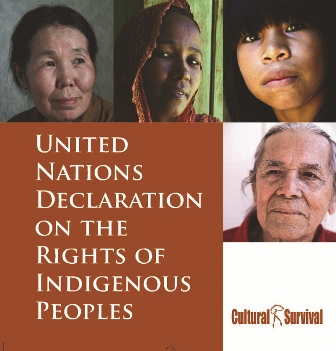The international community marked the fourth anniversary of the adoption of the United Nations Declaration on the Rights of Indigenous Peoples earlier this fall on September 13; however in the United States, the one-year anniversary of U.S. recognition of the landmark human rights instrument occurred in mid-December.
At last winter’s second annual White House Tribal Nations Conference hosted by the Department of Interior, President Obama announced the U.S. would “lend its support” to the Declaration and recognize its baseline standards for human rights for Indigenous Peoples at home and abroad, stating further , “The aspirations it affirms—including the respect for the institutions and rich cultures of Native peoples—are one we must always seek to fulfill.”
One critical issue addressed by the Declaration is language rights: Indigenous Peoples must have the ability to communicate publicly without fear of prejudice, to establish and control educational systems in tribal languages, and to pass on to future generations Indigenous languages, philosophies, and histories, and to retain Indigenous names “for communities, places, and persons.” Language lies at the very heart of what makes us human, and rights to language education and transmission cannot be emphasized enough as they comprise not only the core of Indigenous cultural identities, but also the foundations for Indigenous Peoples’ status as distinct nations with inherent rights to self-determination.
Three key articles—among the Declaration’s 46—explicitly address language (see below); however, more than half of the document can be interpreted as reinforcing language rights when, for example, articles addressing rights to access and worship freely at traditional sacred sites and the rights to remain in tribal homelands without fear of forcible relocation “without the free, prior and informed consent of the indigenous peoples concerned” are considered fully. After all, national policies mandating or prioritizing relocation and “forced assimilation and destruction of [Indigenous] culture” are what have brought tribal languages to their present state of critical endangerment.
While federal laws such as the Native American Languages Acts of 1990 and 1992 offered encouraging and flattering statutory language about the “unique” and “integral” status of tribal languages, in reality, the acts’ promises to address the “lack of clear, comprehensive, and consistent Federal policy on treatment of Native American languages which has often resulted in acts of suppression and extermination of Native American languages and cultures” remain unfulfilled. This is evidenced by the fact that presently—two decades after the acts’ passage—more than half of all remaining Native American languages are spoken fluently only among the most elderly generations in Native communities. More than 70 beautiful spoken national treasures stand at the brink of an abyss of silence.
This past spring, on April 15, exactly four months after President Obama endorsed the U.N. Declaration, the Linguistic Society of America sent him a letter and formal resolution on behalf of their entire national membership asking for him to issue an emergency executive order on Native Language Revitalization. Now, as we approach the one-year anniversary of the Obama Administration’s recognition of Indigenous rights to tribal homelands, languages, and cultures, via the Declaration, we should all join the LSA in calling for immediate targeted executive action to realize the potential for the Native American Languages Acts to finally end the “lack of clear, comprehensive, and consistent Federal policy” toward Native languages, and bring a close to centuries of federal English-only or English-first policies—whether deliberate or unintentional. Tribes in the U.S. stand to lose too much in the coming five years and will need a clear, comprehensive, and consistent Federal policy to reinforce and reinvigorate Native language rights and the ability to teach new generations to speak these ancient mother tongues.
Read the LSA’s letter and Resolution here:
http://www.lsadc.org/info/documents/2011/resolutions/obama-letter-final.pdf
Express your support for their efforts here: http://lsacelp.org/take-action/
or here: http://www.whitehouse.gov/contact
DECLARATION ARTICLES ADDRESSING INDIGENOUS LANGUAGES:
Article 13
1. Indigenous peoples have the right to revitalize, use, develop and transmit to future generations their histories, languages, oral traditions, philosophies, writing systems and literatures, and to designate and retain their own names for communities, places and persons.
2. States shall take effective measures to ensure that this right is protected and also to ensure that indigenous peoples can understand and be understood in political, legal and administrative proceedings, where necessary through the provision of interpretation or by other appropriate means.
Article 14
1. Indigenous peoples have the right to establish and control their educational systems and institutions providing education in their own languages, in a manner appropriate to their cultural methods of teaching and learning.
2. Indigenous individuals, particularly children, have the right to all levels and forms of education of the State without discrimination.
3. States shall, in conjunction with indigenous peoples, take effective measures, in order for indigenous individuals, particularly children, including those living outside their communities, to have access, when possible, to an education in their own culture and provided in their own language.
Article 16
1. Indigenous peoples have the right to establish their own media in their own languages and to have access to all forms of non-indigenous media without discrimination.
2. States shall take effective measures to ensure that State-owned media duly reflect indigenous cultural diversity. States, without prejudice to ensuring full freedom of expression, should encourage privately owned media to adequately reflect indigenous cultural diversity.
